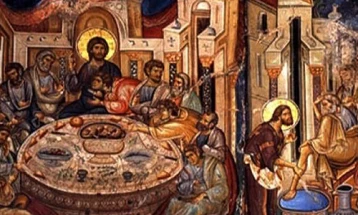
29 October 2022 (MIA)
Macedonian Orthodox Church Calendar
The Holy Martyr Longinus
The divine Matthew the Evangelist, describing the Passion of the Lord Jesus Christ, says: ‘Now when the centurion and they that were with him, watching Jesus, saw the earthquake and the things that were done, they feared greatly, saying: “Truly this was the Son of God” ‘ (Matt. 27:54). That centurion was this blessed Longinus, who, with two other of his soldiers, came to believe in Jesus as the Son of God. He was the officer in command both at the Lord’s crucifixion on Golgotha and in the watch that guarded the tomb. When the Jewish elders learned of Christ’s Resurrection, they bribed the soldiers to spread the falsehood that Christ had not risen, but that His disciples had stolen His body. The Jews tried to bribe Longinus also, but without success. Then the Jews resorted to their usual practice: they conspired to kill Longinus. Discovering this, Longinus took off his army belt, received baptism from the apostles together with his two friends, and with them secretly left Jerusalem and went to Cappadocia. There he gave himself to fasting and prayer and, as a living witness of the Resurrection of Christ, turned many pagans to the true Faith by his testimony. He then went off to a village where his father had property, but the wicked Jews would not even there leave him in peace. In response to slander on their part, Pilate sent soldiers to behead Longinus. Holy Longinus foresaw in his spirit the approach of his executioners and, going out to meet them, took them to his home without telling them who he was. The soldiers lay down to sleep, and St Longinus spent the whole night preparing for death. In the morning, he went and brought his two friends, dressed himself in white grave-clothes, told the others in the house what was happening and showed them a place on a hillock to bury him. He then revealed himself to the soldiers as the Longinus whom they were seeking. The soldiers were embarrassed and ashamed, and would not think of beheading Longinus, but he laid it on them to carry out their superior’s command, and he and his two friends were beheaded. The soldiers took Longinus’s head to Pilate; Pilate gave it to the Jews and they flung it onto a dung-heap outside the city.
Catholic Calendar
St. Narcissus
St. Narcissus Bishop of Jerusalem October 29 Second Century St. Narcissus was born towards the close of the first century, and was almost fourscore years old when he was placed at the head of the church of Jerusalem, being the thirtieth bishop of that see. In 195, he and Theophilus, bishop of Caesarea in Palestine, presided in a council of the bishops of Palestine held at Caesarea, about the time of celebrating Easter; in which it was decreed that this feast is to be kept always on a Sunday, and not with the Jewish passover. Eusebius assures us, that the Christians of Jerusalem preserved in his time the remembrance of several miracles, which God had wrought by this holy bishop; one of which he relates as follows. One year on Easter-eve the deacons were unprovided with oil for the lamps in the church, necessary at the solemn divine office that day. Narcissus ordered those who had care of the lamps to bring him some water from the neighbouring wells. This being done, he pronounced a devout prayer over the water; then bade them pour it into the lamps; which they did, and it was immediately converted into oil, to the great surprise of the faithful. Some of this miraculous oil was kept there as a memorial at the time when Eusebius wrote his history. The veneration of all good men for this holy bishop could not shelter him from the malice of the wicked. Three incorrigible sinners, fearing his inflexible severity in the observance of ecclesiastical discipline, laid to his charge a detestable crime, which Eusebius does not specify. They confirmed their atrocious calumny by dreadful oaths and imprecations; one wishing he might perish by fire, another, that he might be struck with a leprosy, and the third, that he might lose his sight, if what they alleged was not the truth. Notwithstanding these protestations, their accusation did not find credit; and, some time after, the divine vengeance pursued the calumniators. He spent several years undiscovered in his retreat, where he enjoyed all the happiness and advantage, which a close conversation with God can bestow. That his church might not remain destitute of a pastor, the neighbouring bishops of the province, after some time, placed in it Pius, and after him Germanion, who, dying in a short time, was succeeded by Gordius. While this last held the see, Narcissus appeared again like one from the dead. The whole body of the faithful, transported at the recovery of their holy pastor, whose innocence had been most authentically vindicated, conjured him to reassume the administration of the diocese. He acquiesced; but afterwards, bending under the weight of extreme old age, made St. Alexander his coadjutor. The Roman Martyrology honours his memory on the 29th of October. The pastors of the primitive church, animated with the spirit of the apostles were faithful imitators of their heroic virtues, discovering the same fervent zeal. The same contempt of the world, the same love of Christ. If we truly respect the church as the immaculate spouse of our Lord, we will incessantly pray for its exaltation and increase, and beseech the Almighty to give it pastors according to his own heart, like those who appeared in the infancy of Christianity.







